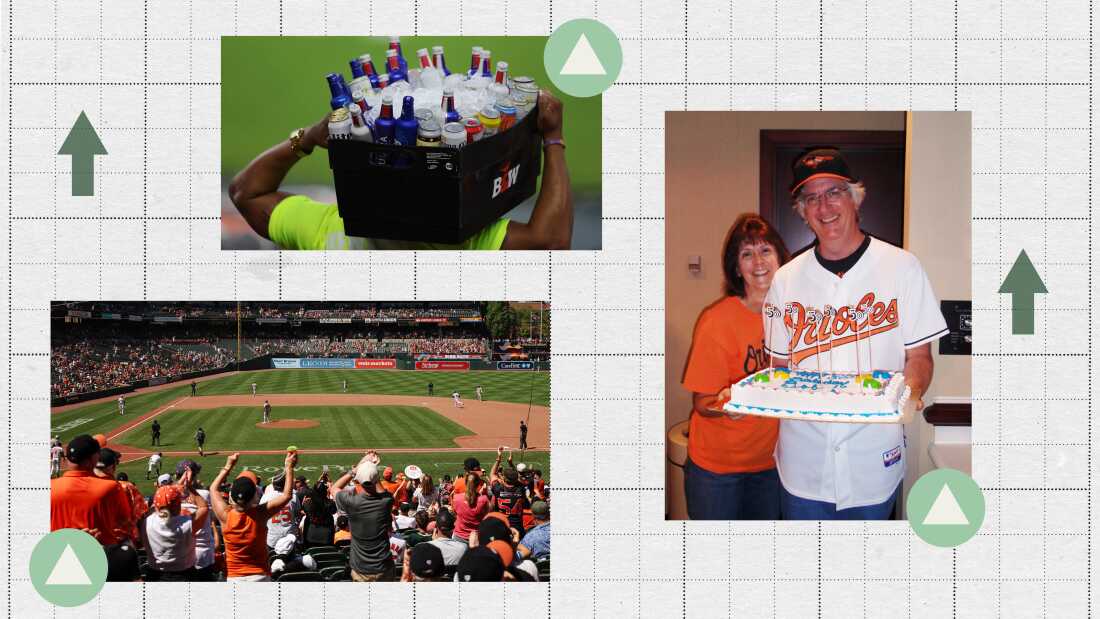
Sports ticket prices in the U.S. have more than doubled in the past 25 years. Bob Hinz (right) has been a Baltimore Orioles season ticket holder for two decades but recent price increases have caused him to reconsider.
. and via Bob Hinz/Emily Bogle/NPR
hide caption
toggle caption
. and via Bob Hinz/Emily Bogle/NPR
What’s the item?
Sports ticket prices
How has the price changed over the past two decades?
Prices have more than doubled since the Labor Department started tracking sports ticket prices in 1999.
Why have prices gone up?
Because as every sports star from LeBron James to Carmelo Anthony has said, “It’s a business.”
Costs, including athlete salaries, have surged. But there are three main reasons why teams are hiking ticket prices:
First, they would rather sell fewer seats at higher prices, than more seats at a lower price. It’s similar to how airlines often make more money from their Business Class section rather than from selling lots of seats in Economy.
In addition, dynamic pricing — or adjusting prices based on demand — has allowed teams to wring out more money per ticket.
And then, there’s this: Teams are offering more premium experiences — meaning swanky club areas and plush seats — because those seats allow them to charge higher prices.
All these dynamics are familiar to Bob Hinz. He’s been a fan of the Baltimore Orioles for just about as long as he can remember.
He has many fond memories of the team and of Camden Yards, a ballpark that was kind of revolutionary when it was unveiled in 1992, with its retro design and old-school charm.

Hinz with his wife poses at the field in Camden Yards.
Bob Hinz
hide caption
toggle caption
Bob Hinz
And Camden Yards largely retained that identity over the years. Unlike other, more modern ballparks, Camden doesn’t have ginormous seats behind home plate — or servers to bring cold beers to fans at their seats.
Want a hot dog? You walk up the stairs for one — just like everybody else.
“Baltimore is a blue collar town,” Hinz says. “Always has been and always will be.”
Tickets have been affordable enough for Hinz to remain a season ticket holder for about two decades, even through seasons when the team was pretty bad.
But Hinz was shocked when he got his renewal notice for next year. The Orioles, which was bought recently by an ownership group led by financier David Rubenstein, had introduced a major revamp to its season ticket offerings, leading to bigger — and more expensive — packages.
Hinz was floored. He and his wife bought seats for 13 games — at a cost of about $1,400 this past season. To retain their seats, the Orioles was now requiring them to sign up for a 20-game package.
“I looked at it as a per-game price,” Hinz says. “And the per game price was up 35% from the prior year.”
(Full disclosure here, this NPR reporter is an Orioles season ticket holder who got the same message.)
“It’s a business”
Many fans reacted with outrage on social media.
In a statement to NPR, the team says the actions are intended “to deliver more tailored benefits” as well as “greater flexibility, in a simpler benefit program providing the best possible experience.”
“These changes were made to ensure our Members were getting the best value for their investment,” the Orioles added.

Pictured is a general view of the Babe Ruth statue outside of Camden Yards in Baltimore, Md., on April 7, 2023.
Rob Carr/. North America
hide caption
toggle caption
Rob Carr/. North America
And the team says its new season ticket options of 20-game, 40-game and full-season memberships are intended to align with 27 other Major League Baseball teams.
Hinz, an accountant, gets it. Like other Orioles fans who spoke to NPR, Hinz says, “It’s a business.”

Nonetheless, he was surprised.
“It really didn’t matter … what kind of fan I was or how long a fan I was,” he says. “It’s just, this is the price and that’s it.”
Understanding sports economics
For Victor Matheson, a professor at College of the Holy Cross in Massachusetts who’s an expert on sports economics, actions like the ones the Orioles is taking make complete sense from a business perspective.
Across pro sports, Matheson says, teams are making the determination that “they can make more money selling fewer, more expensive tickets rather than lots of cheap seats.”
One way Matheson says teams are doing that is by replacing aging stadiums with nicer ones that have fewer seats, with the aim of raising more money per ticket sold.
Teams are also widely adopting dynamic pricing, or adjusting prices based on demand. They can do that because teams are now able to leverage technology to gather as much information as they can on their fans — and their ability to pay.
And then there’s one of the biggest reasons of all: Teams are increasingly focusing on selling premium seats and what they label as premium experiences. That could mean special club areas or, during certain times in NFL games, the opportunity to stand on the sidelines.
“You concentrate your efforts on, you know, finding those super premium experiences for a small number rather than maximizing the total number of bodies you get through the gates,” Matheson says.
The cost of enhancing the fan experience
In Baltimore, the Orioles are adapting to what they believe will be a better — and nicer — future.
For example, as part of a $600 million funding from Maryland taxpayers, the team is undertaking major renovations of Camden Yards, including a bigger scoreboard.

But they are also using some of the money to build a “premium club.” A video rendering on the team’s website shows a luxurious setting, with its own entrance and tables and bartenders pouring wine. The team told NPR the club is intended to provide “a more elevated club experience” where members “can entertain clients and friends.”
The Orioles also says it wants “to welcome fans who are looking for different experiences,” including the recent introduction of a “Bird Bath Splash Zone” section — where fans get soaked with a hose during periods of the game.
On one level, Hinz understands. But he never realized how much that Orioles future would cost him as a loyal fan.
“It just felt a little like I’m just another number, and that’s all that really matters to them,” Hinz says.
So he and wife thought long and hard. The fan in him wanted to renew again. As a kid he still remembers how “there was a certain prestige associated with being a season ticket holder. “
But the accountant in him knew.
“My wife and I, we need to do what makes sense for us,” he says.
And then Hinz sighed. After more that 20 years, he’s giving up his beloved tickets.
He’ll always love the Orioles. But as they say in sports: At the end of the day, it’s a business.